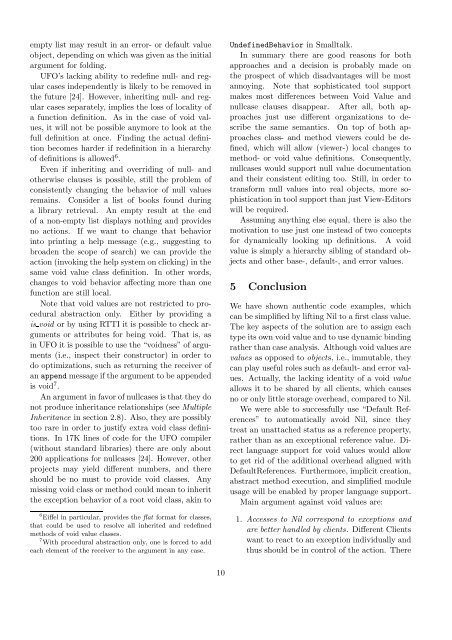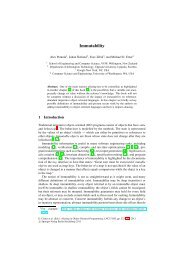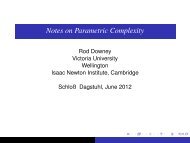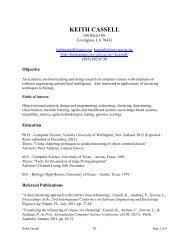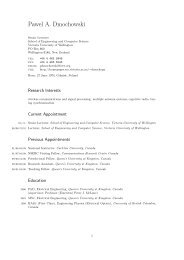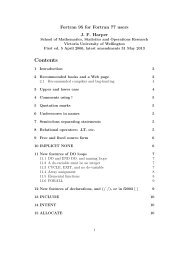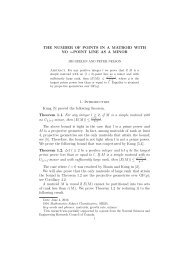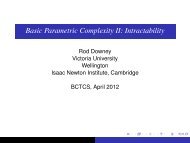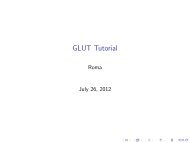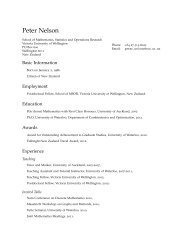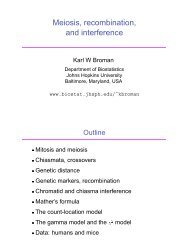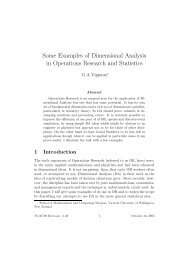Nil and None considered Null and Void - School of Engineering and ...
Nil and None considered Null and Void - School of Engineering and ...
Nil and None considered Null and Void - School of Engineering and ...
Create successful ePaper yourself
Turn your PDF publications into a flip-book with our unique Google optimized e-Paper software.
empty list may result in an error- or default value<br />
object, depending on which was given as the initial<br />
argument for folding.<br />
UFO’s lacking ability to redefine null- <strong>and</strong> regular<br />
cases independently is likely to be removed in<br />
the future [24]. However, inheriting null- <strong>and</strong> regular<br />
cases separately, implies the loss <strong>of</strong> locality <strong>of</strong><br />
a function definition. As in the case <strong>of</strong> void values,<br />
it will not be possible anymore to look at the<br />
full definition at once. Finding the actual definition<br />
becomes harder if redefinition in a hierarchy<br />
<strong>of</strong> definitions is allowed 6 .<br />
Even if inheriting <strong>and</strong> overriding <strong>of</strong> null- <strong>and</strong><br />
otherwise clauses is possible, still the problem <strong>of</strong><br />
consistently changing the behavior <strong>of</strong> null values<br />
remains. Consider a list <strong>of</strong> books found during<br />
a library retrieval. An empty result at the end<br />
<strong>of</strong> a non-empty list displays nothing <strong>and</strong> provides<br />
no actions. If we want to change that behavior<br />
into printing a help message (e.g., suggesting to<br />
broaden the scope <strong>of</strong> search) we can provide the<br />
action (invoking the help system on clicking) in the<br />
same void value class definition. In other words,<br />
changes to void behavior affecting more than one<br />
function are still local.<br />
Note that void values are not restricted to procedural<br />
abstraction only. Either by providing a<br />
is void or by using RTTI it is possible to check arguments<br />
or attributes for being void. That is, as<br />
in UFO it is possible to use the “voidness” <strong>of</strong> arguments<br />
(i.e., inspect their constructor) in order to<br />
do optimizations, such as returning the receiver <strong>of</strong><br />
an append message if the argument to be appended<br />
is void 7 .<br />
An argument in favor <strong>of</strong> nullcases is that they do<br />
not produce inheritance relationships (see Multiple<br />
Inheritance in section 2.8). Also, they are possibly<br />
too rare in order to justify extra void class definitions.<br />
In 17K lines <strong>of</strong> code for the UFO compiler<br />
(without st<strong>and</strong>ard libraries) there are only about<br />
200 applications for nullcases [24]. However, other<br />
projects may yield different numbers, <strong>and</strong> there<br />
should be no must to provide void classes. Any<br />
missing void class or method could mean to inherit<br />
the exception behavior <strong>of</strong> a root void class, akin to<br />
6 Eiffel in particular, provides the flat format for classes,<br />
that could be used to resolve all inherited <strong>and</strong> redefined<br />
methods <strong>of</strong> void value classes.<br />
7 With procedural abstraction only, one is forced to add<br />
each element <strong>of</strong> the receiver to the argument in any case.<br />
UndefinedBehavior in Smalltalk.<br />
In summary there are good reasons for both<br />
approaches <strong>and</strong> a decision is probably made on<br />
the prospect <strong>of</strong> which disadvantages will be most<br />
annoying. Note that sophisticated tool support<br />
makes most differences between <strong>Void</strong> Value <strong>and</strong><br />
nullcase clauses disappear. After all, both approaches<br />
just use different organizations to describe<br />
the same semantics. On top <strong>of</strong> both approaches<br />
class- <strong>and</strong> method viewers could be defined,<br />
which will allow (viewer-) local changes to<br />
method- or void value definitions. Consequently,<br />
nullcases would support null value documentation<br />
<strong>and</strong> their consistent editing too. Still, in order to<br />
transform null values into real objects, more sophistication<br />
in tool support than just View-Editors<br />
will be required.<br />
Assuming anything else equal, there is also the<br />
motivation to use just one instead <strong>of</strong> two concepts<br />
for dynamically looking up definitions. A void<br />
value is simply a hierarchy sibling <strong>of</strong> st<strong>and</strong>ard objects<br />
<strong>and</strong> other base-, default-, <strong>and</strong> error values.<br />
5 Conclusion<br />
We have shown authentic code examples, which<br />
can be simplified by lifting <strong>Nil</strong> to a first class value.<br />
The key aspects <strong>of</strong> the solution are to assign each<br />
type its own void value <strong>and</strong> to use dynamic binding<br />
rather than case analysis. Although void values are<br />
values as opposed to objects, i.e., immutable, they<br />
can play useful roles such as default- <strong>and</strong> error values.<br />
Actually, the lacking identity <strong>of</strong> a void value<br />
allows it to be shared by all clients, which causes<br />
no or only little storage overhead, compared to <strong>Nil</strong>.<br />
We were able to successfully use “Default References”<br />
to automatically avoid <strong>Nil</strong>, since they<br />
treat an unattached status as a reference property,<br />
rather than as an exceptional reference value. Direct<br />
language support for void values would allow<br />
to get rid <strong>of</strong> the additional overhead aligned with<br />
DefaultReferences. Furthermore, implicit creation,<br />
abstract method execution, <strong>and</strong> simplified module<br />
usage will be enabled by proper language support.<br />
Main argument against void values are:<br />
1. Accesses to <strong>Nil</strong> correspond to exceptions <strong>and</strong><br />
are better h<strong>and</strong>led by clients. Different Clients<br />
want to react to an exception individually <strong>and</strong><br />
thus should be in control <strong>of</strong> the action. There<br />
10


